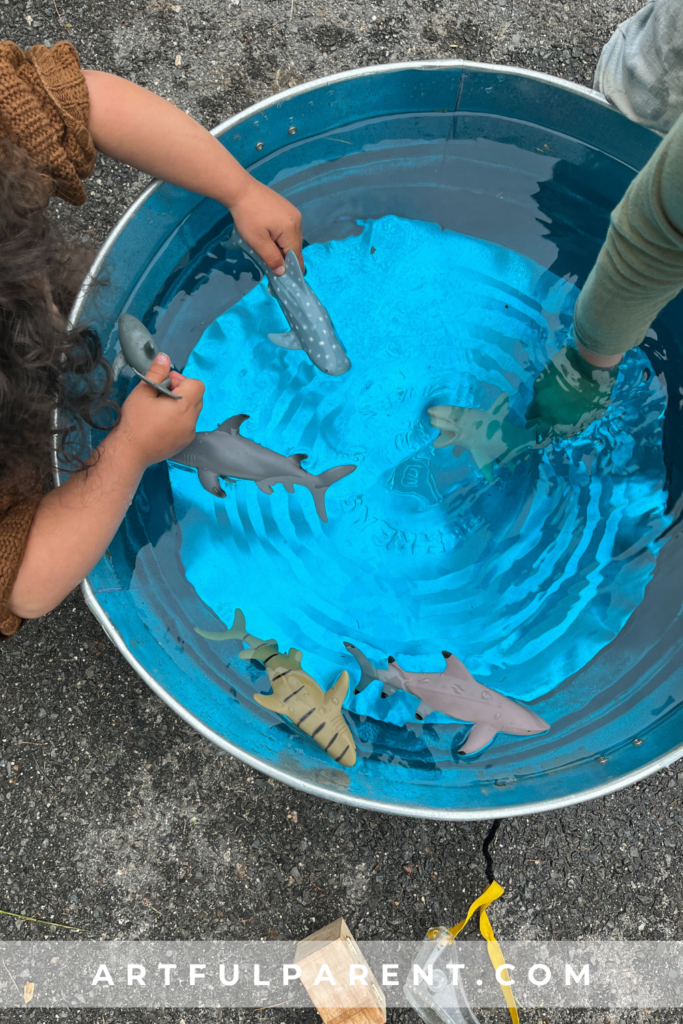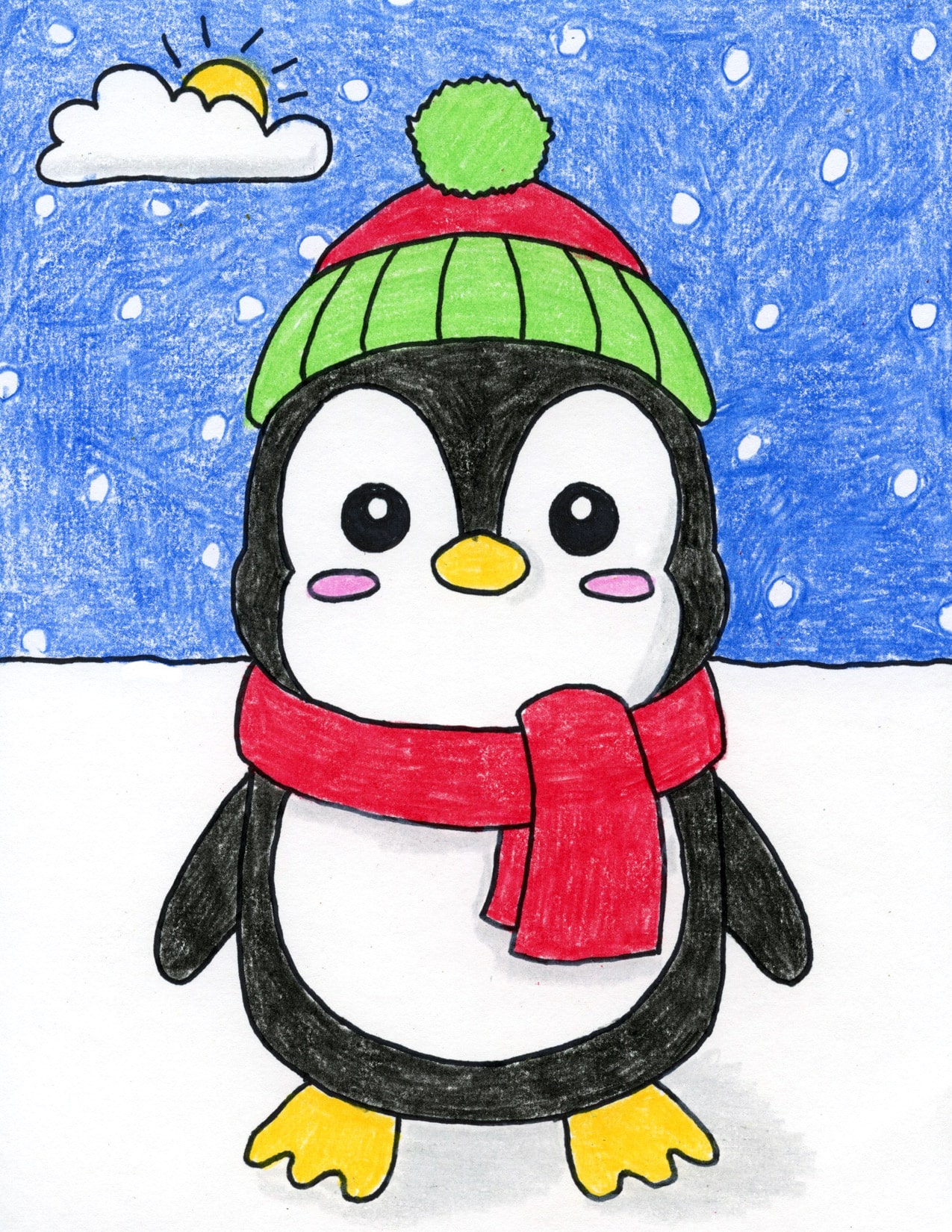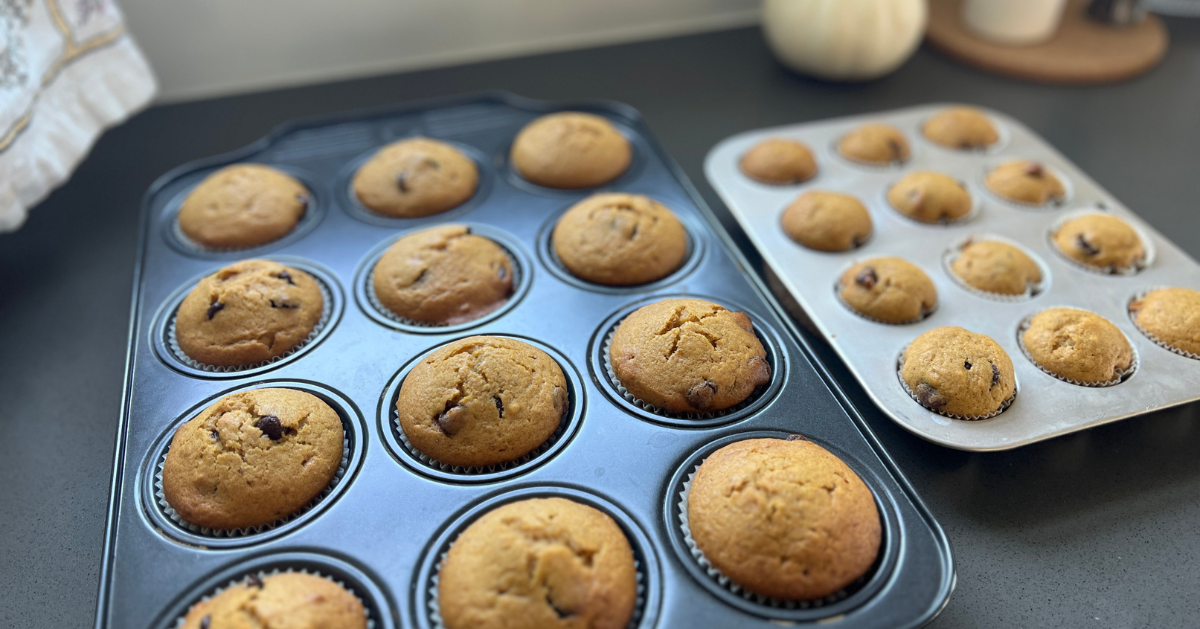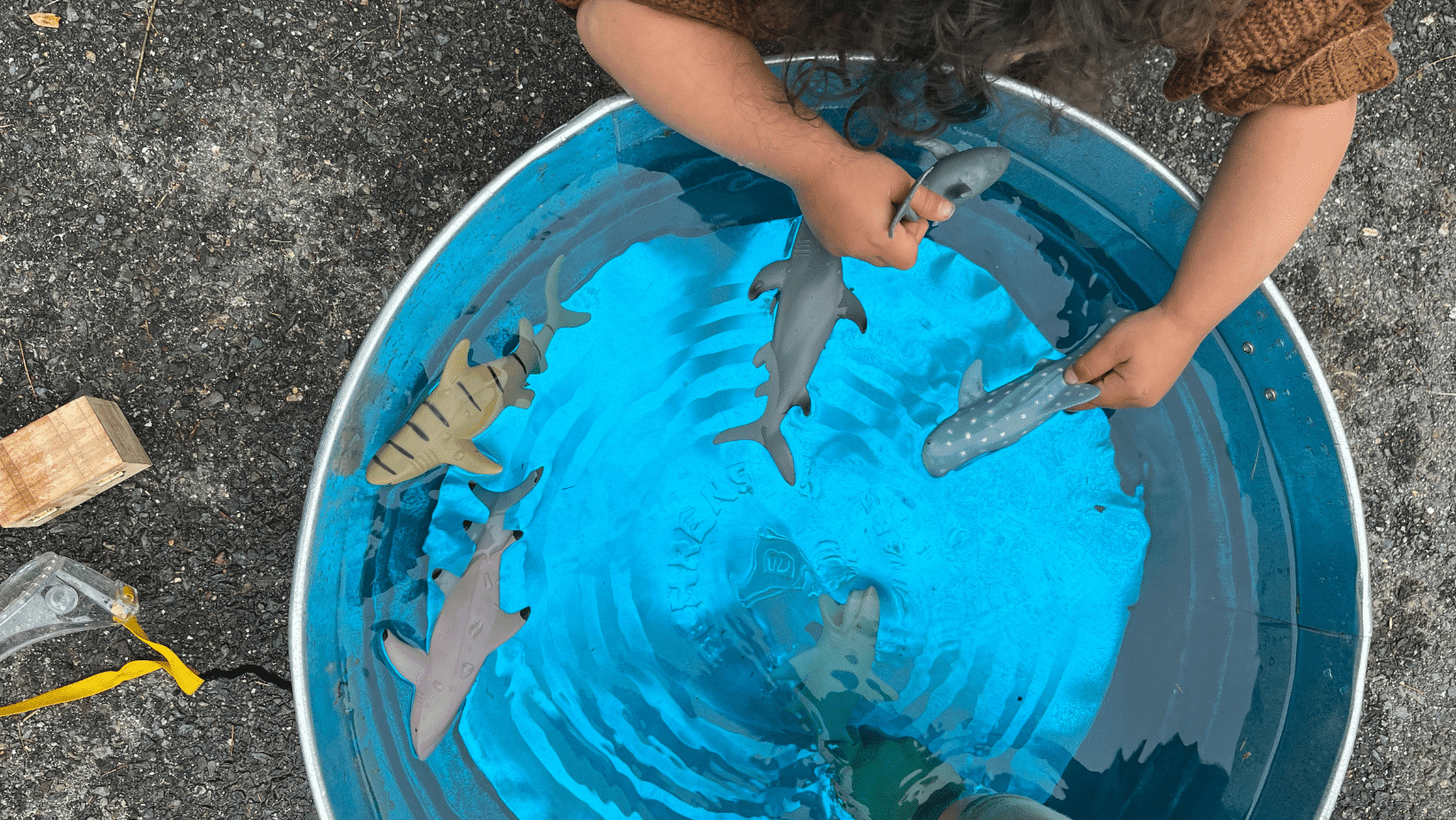
Sensory bins for 2 year olds encourages exploration of materials and promotes creative, imaginative play time for kids.
Updated May 2023
At my toddler art classes, I always include a sensory play station in addition to the main art activity. The kids are drawn to that table and it’s so fun to watch the magic unfold.
And over the past year with my own kids, we’ve been trying lots of new sensory play setups. I’m learning from other teachers and parents how to engage my children’s natural curiosity and propensity for play this way.
If this is all new to you, you might be wondering why toddlers are so captivated by sensory play––and why it’s so important?
The combination of art and sensory play is especially appealing to toddlers in part, I think, because its very nature encourages young kids to touch it, squeeze it, sift it, and yes––even taste it.
With that in mind, the toddler sensory play list contains mostly materials that are taste safe, meaning totally non-toxic and ok if swallowed (with the exception of bubble foam & kinetic sand).
Toddlers learn about the world around them through exploration and sensory play activities invite kids to do just that. Sensory play calms and focuses kids. It builds fine motor skills as they practice pouring, sifting, squeezing and scooping the materials. And it sparks imagination and excitement.
Remember back to your own childhood. I imagine it likely included a sand box or days at the beach. Or other water play such as swimming or running through a sprinkler. Or maybe you made mud pies and liked jumping in puddles. All these activities share a common theme of providing a sensory rich and captivating experience for kids.
Ways to Reduce the Mess
How can we reduce the mess and stress surrounding sensory materials to fully embrace the beauty that these art/play experiences can give to our children?
As I mentioned above, sensory play activities provide the opportunity for parents and teachers to say YES to creative play. Try to set up the environment so there are not many limitations and toddlers can really explore the materials.
With that said, there are of course some ground rules. For our family, if I have our sensory table set up, there is usually an old sheet or tablecloth underneath it to make cleanup easy. Even with the best intentions, some materials will be spilled and at the end of the play session these can easily be poured off the sheet back into the bin.
Which brings me to the bin. This is what keeps the activity contained and I personally feel it’s a must have. You can use a big clear plastic bin or you might splurge and go for the IKEA FLISAT table with TROFAST bins.
The guidelines in our house is the materials must stay in the bin, if they can’t, we’ll try the activity again later.
And finally, some sensory materials involve too much cleanup for me indoors (ahem, children covered in cloud dough). So we save those for warmer weather outside.
A few resources to get you started
One final thought about playdough. It’s a great bridge between sensory play and art materials. So many kids absolutely love it.
In our home, it’s one of the most frequently used art materials, in part because of its wonderful sensory play aspect, but it also functions as an age-appropriate sculpture material.
Now on to my favorite sensory play recommendations for toddlers:
Also Read : Back to School Supply Kits from SchoolKidz
Sensory Bins for 2 Year Olds
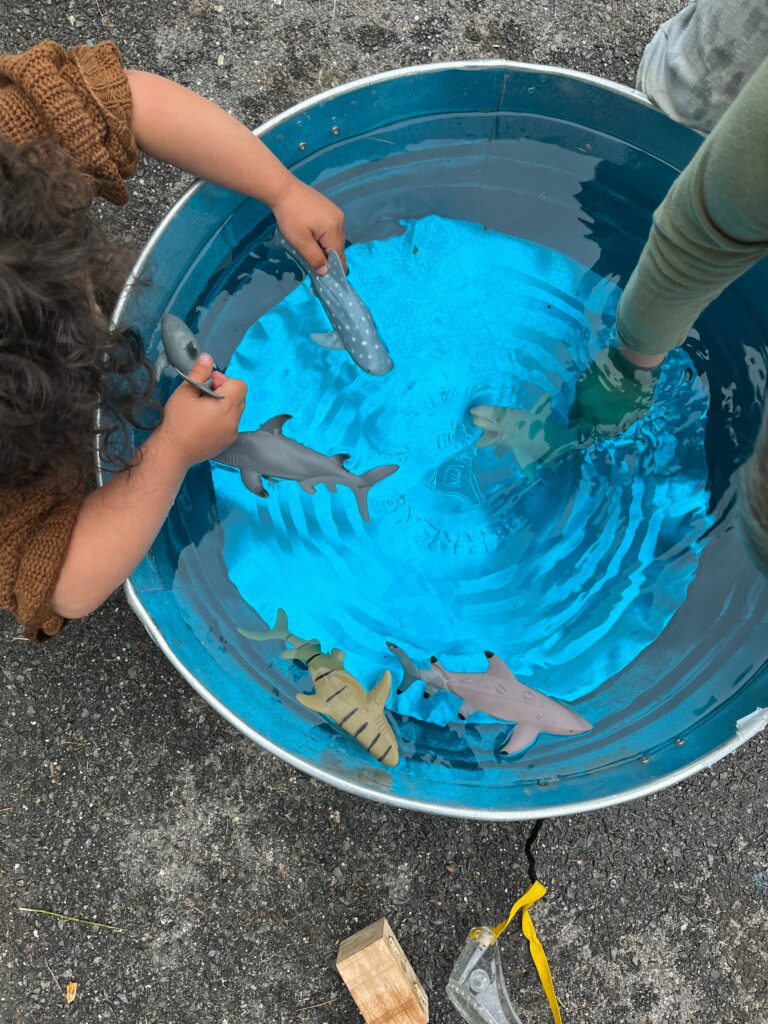
1. Water play
This one is so simple but draws kids in every time. Add a few drops of food coloring, some flowers, toys or recycled lids. Kids love to strain materials.
2.
Cloud dough
Kids love cloud dough and did you know, it’s super easy to make? Check out our simple recipe above!
After a while the cloud dough might be ready for composting, but before that––let kids add water and cocoa powder (or food coloring) to create mud or cement. Add a few trucks to the mix and watch their creative play emerge.
Cornmeal makes a fun flour free substitute for cloud dough. I heard about this from Alie at CreationSpace who suggested baking setups with bowls, spoons and shakers containing various spices. Or try in a play bin as pictured above with other materials.
3. Aquafaba
This play foam is taste safe making it the perfect toddler sensory material. It’s made from chickpea liquid and cream of tartar whipped together.
4. Bubble Foam
Take water play to a whole new level by mixing a squeeze of dish soap with water and beating it until some VERY foamy bubbles appear. (Use the biggest bowl you have for this one.)
Bubble foam is 1 part (tear free) bubble bath to 2 parts water.
This is great for car washes, baby doll baths, scrubbing dinosaurs or even scrubbing a pumpkin!
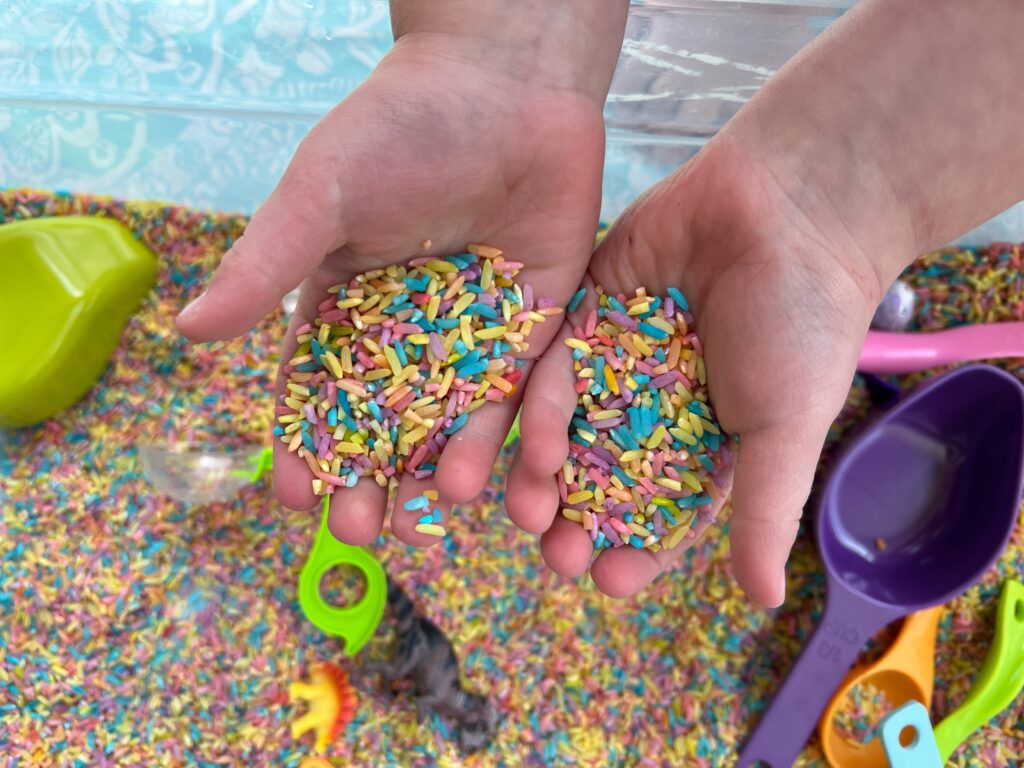
5. Rice Table
It’s easy to dye your own rice with liquid watercolors (or food coloring) and vinegar. I like to put expired rice in a ziploc bag, squirt in the dye and add a few drops of vinegar. Shake to incorporate the color well and open the bag wide to air dry. Or spread the rice out on a baking sheet to dry. When stored in a cool, dry place, colored rice will keep for years!
Add pom poms, scoopers, vessels and other fun additions to encourage creative play for kids.
6. Oobleck
Simply a mix of cornstarch and water, oobleck is a non-Newtonian fluid and on its own is fascinating for children. Add construction vehicles, strainers, berry containers, colanders for exciting exploration of this sensory material.
7. Kinetic Sand
This one caught me by surprise. After buying kinetic sand for my preschooler, I found my daughter asking for it daily for a few weeks straight! It’s fun to play with on its own or add little toys and things to poke in it.
My kids enjoy rolling it out and pressing stamps or objects into the sand. But as I mentioned, the sand itself is so satisfying to touch and watch it move!
Hire Cartoon characters For Birthday Party | Jinzzy Customer ❤️
More Art and Sensory Bins for 2 Year Olds
Pin It For Later
